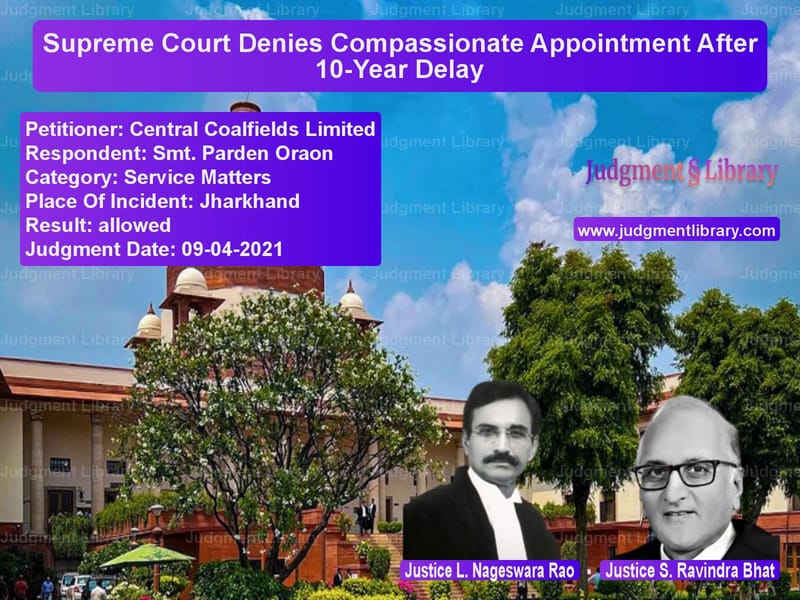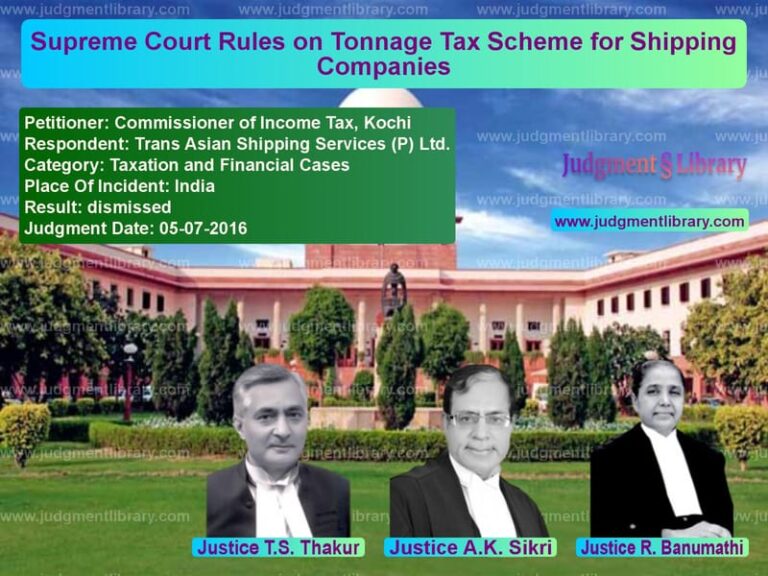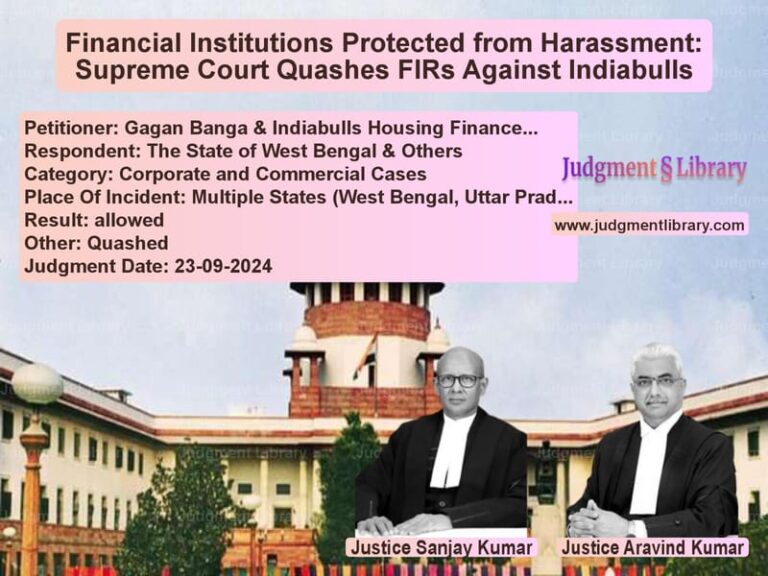Supreme Court Denies Compassionate Appointment After 10-Year Delay
The Supreme Court of India, in the case of Central Coalfields Limited v. Smt. Parden Oraon, ruled against granting compassionate appointment to the son of a missing employee, citing a significant delay in the request. The judgment reinforces the principle that compassionate appointments are meant for immediate financial relief and cannot be claimed after a prolonged period.
Background of the Case
The case arose from a request by the respondent, Smt. Parden Oraon, whose husband was employed as an Operator (Helper Category-II) at Gidi Washery, a unit under Central Coalfields Limited (CCL). He was reported missing on October 3, 2002, and a missing person report was filed at Bhurkunda Police Station, Hazaribagh. Subsequently, CCL initiated disciplinary proceedings against him for unauthorized absence, and his employment was terminated on September 21, 2004.
Read also: https://judgmentlibrary.com/supreme-court-rules-on-ex-servicemens-seniority-in-punjab-civil-service/
In 2009, the respondent filed a civil suit seeking a declaration of civil death, which was granted by the Additional Munsif Court, Hazaribagh, on July 13, 2012. Based on this decree, she applied for compassionate appointment for her son in 2013. The request was rejected by CCL on the grounds that her husband had been dismissed from service and that a company policy decision in 2013 barred compassionate appointments for families of employees deemed to have suffered civil death.
The Jharkhand High Court ruled in favor of the respondent, setting aside the rejection and directing CCL to reconsider the application. CCL appealed to the Supreme Court.
Key Issues Raised
- Whether the rejection of the request for compassionate appointment was justified under the company’s policies.
- Whether the delay of over 10 years in applying for compassionate appointment affected the claim.
- Whether the High Court erred in quashing the termination order and directing reconsideration of the application.
- Whether the employment of the respondent disqualified her son from claiming compassionate appointment.
Arguments by the Appellant (Central Coalfields Limited)
- “Compassionate appointments are meant to provide immediate financial relief and not to be claimed after a decade.”
- “The termination of the respondent’s husband in 2004 legally prevented any posthumous benefits, including compassionate appointment.”
- “A 2013 company policy explicitly barred compassionate appointments in cases where employees were declared to have suffered civil death.”
- “The respondent was employed and financially stable, negating the need for a compassionate appointment for her son.”
Arguments by the Respondent (Smt. Parden Oraon)
- “The termination was illegal as her husband was already missing, and the civil court’s decree of civil death nullifies the dismissal.”
- “The policy cited by CCL was a mere internal discussion and not a legally binding regulation.”
- “The National Coal Wage Agreement (NCWA) does not prohibit compassionate appointments in cases of civil death.”
- “The High Court correctly ruled that her son was eligible for compassionate appointment under the prevailing scheme.”
Supreme Court’s Observations and Ruling
1. Objective of Compassionate Appointment
- “The whole object of granting compassionate appointment is to enable the family to tide over the sudden crisis due to the death of the sole breadwinner.”
- “Compassionate appointment is not a vested right and must be exercised within a reasonable time.”
2. Effect of Delay in Application
- “The respondent’s husband had been missing since 2002, yet the request for compassionate appointment was made only in 2013—more than 10 years later.”
- “A prolonged delay in claiming compassionate appointment negates the urgency and purpose behind such a policy.”
3. Employment of the Respondent
- “The respondent was employed by CCL, and her financial stability meant that the primary objective of compassionate appointment—to provide immediate relief—was not applicable.”
- “There is no clause in the NCWA that prohibits appointment based on dual employment, but the financial stability of the applicant is a key consideration.”
4. Validity of CCL’s Policy
- “While the 2013 policy barring compassionate appointments in cases of civil death was not a formal regulation, the company’s decision was not unreasonable.”
- “Even in the absence of a specific policy, the lapse of time and the respondent’s financial situation justify rejection of the claim.”
Supreme Court’s Judgment
The Supreme Court ruled as follows:
- The appeal by CCL is allowed, and the High Court’s decision is set aside.
- The respondent’s son is not entitled to compassionate appointment due to the delay in filing the application and the respondent’s financial stability.
- The ruling reinforces that compassionate appointment is not an absolute right and must be exercised within a reasonable timeframe.
Key Takeaways from the Judgment
- Compassionate appointment is meant for immediate relief: A delay of 10 years defeats the very purpose of such appointments.
- Employment of the applicant affects eligibility: If a surviving family member is already employed and financially stable, the necessity for compassionate appointment is diminished.
- Company policies influence appointment decisions: While a formal policy may not have existed, CCL’s decision was upheld as reasonable and justified.
- Court cannot overrule company policies arbitrarily: The Supreme Court held that courts should not interfere in administrative decisions unless they are arbitrary or illegal.
Conclusion
The Supreme Court’s ruling in Central Coalfields Limited v. Smt. Parden Oraon reinforces that compassionate appointments must be exercised within a reasonable timeframe. The judgment ensures that the policy remains a tool for immediate relief rather than a long-term entitlement. It also clarifies that financial stability of the applicant plays a key role in determining eligibility, preventing misuse of compassionate appointment policies.
Read also: https://judgmentlibrary.com/supreme-court-upholds-promotion-criteria-for-haryana-police-inspectors/
Petitioner Name: Central Coalfields Limited.Respondent Name: Smt. Parden Oraon.Judgment By: Justice L. Nageswara Rao, Justice S. Ravindra Bhat.Place Of Incident: Jharkhand.Judgment Date: 09-04-2021.
Don’t miss out on the full details! Download the complete judgment in PDF format below and gain valuable insights instantly!
Download Judgment: central-coalfields-l-vs-smt.-parden-oraon-supreme-court-of-india-judgment-dated-09-04-2021.pdf
Directly Download Judgment: Directly download this Judgment
See all petitions in Employment Disputes
See all petitions in Pension and Gratuity
See all petitions in Judgment by L. Nageswara Rao
See all petitions in Judgment by S Ravindra Bhat
See all petitions in allowed
See all petitions in supreme court of India judgments April 2021
See all petitions in 2021 judgments
See all posts in Service Matters Category
See all allowed petitions in Service Matters Category
See all Dismissed petitions in Service Matters Category
See all partially allowed petitions in Service Matters Category







